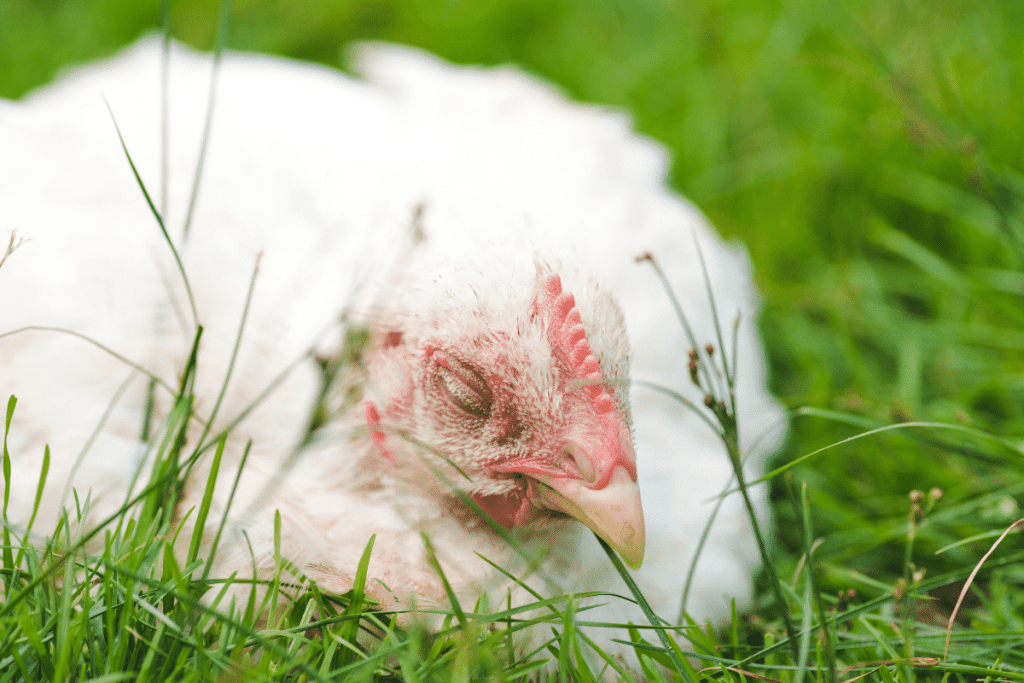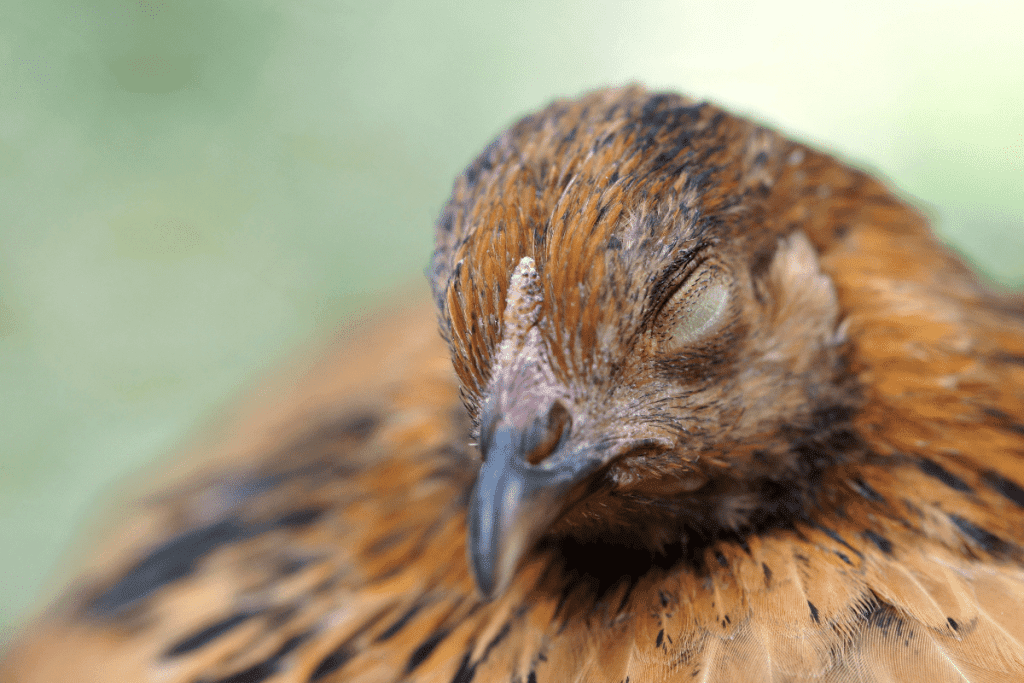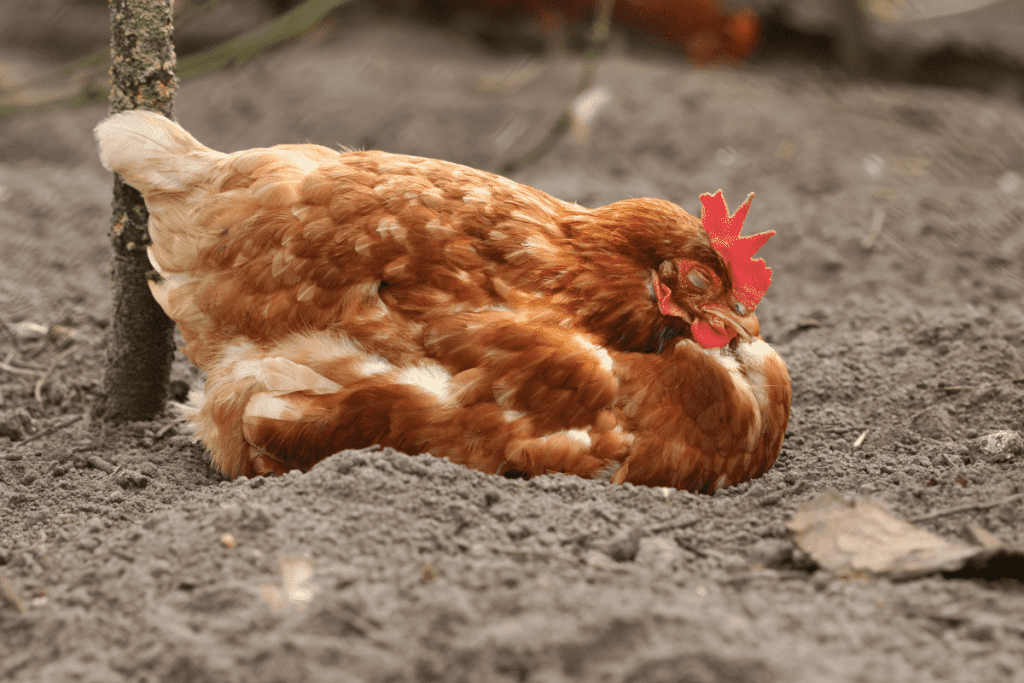Chickens are typically voracious eaters, and they are known to forage for food whenever necessary.
Unfortunately, your chicken has several reasons to eat less or stop eating altogether.
There are many wasting diseases and intestinal parasites prevalent in domestic chickens, and they may also have difficulty eating due to an injury to their beak.
To prevent these diseases, it is essential to maintain a clean environment for your chickens.
If one of your chickens has unexplained weight loss and has become lethargic, it is crucial to seek veterinary care as soon as possible to avoid spreading contagious disease to the rest of the flock.
Understanding these medical conditions’ clinical signs and symptoms will allow you to recognize when you have sick birds.
Read on for our list of 14 reasons your chicken may be losing weight or acting lethargic.

Table of Contents
ToggleAir Sac Disease
Air sac disease is a respiratory illness found in young chicks between 6-9 weeks old.
The disease is caused by bacteria, such as E. coli or Mycoplasma gallisepticum.
Symptoms of air sac disease include:
- Weight loss
- Coughing
- Difficulty breathing
- Nasal discharge
- Watery eyes
Young chicks infected with air sac disease will not grow normally due to a lack of appetite.
To prevent air sac disease, ensure the chicks stay warm and have proper ventilation.
Sick birds will likely recover with a diet rich in protein and vitamin E, but they will remain carriers of the disease and may infect other chickens.
Arthritis
A staph infection usually causes arthritis in chickens in their joints.
Chickens can contract a staph infection when the bacteria gets into an open wound or by drinking from mud puddles.
The main sign of arthritis in chickens is hot, swollen joints, which will cause the bird to limp.
Another common symptom of arthritis in chickens is lethargy to developing breast blisters.
Since the chicken will have difficulty moving, it may eat less and lose weight.
To prevent staph infections, avoid crowded conditions and keep the chicken run dry and clean.
Your veterinarian will run tests to determine which strain of staph your chicken is infected with and then prescribe the proper antibiotics for treatment.
Avian Influenza
Avian influenza will quickly spread through a large flock of chickens.
This viral infection is spread through nose, mouth, eye secretions, and infected droppings and contaminated surfaces.
Symptoms of avian influenza will vary depending on the strain of the virus.
An otherwise healthy chicken infected with a mild strain of avian influenza may not have any obvious signs of illness.
Severe avian influenza infections in chickens will cause:
- Diarrhea
- Sneezing
- Coughing
- Lethargy
- Weight loss
- Paralysis
- Reduced egg production
- Tremors
- Death
To protect your flock from avian influenza, maintain a clean habitat, avoid cross-contamination between infected birds and healthy ones, and quarantine any new chickens for at least 30 days.
Avian Tuberculosis
Avian tuberculosis is a chronic wasting disease caused by the bacteria Mycobacterium avium.
The disease is transmitted through soil, feed, or water contaminated by feces from an infected bird.
The most common signs of avian tuberculosis are lethargy and weight loss, even if the chicken is eating plenty of food.
A chicken infected with avian tuberculosis may have the disease for years before dying, but death usually happens quickly.
There is no successful treatment for avian tuberculosis in chickens, and infected birds will most likely need to be euthanized to prevent spreading the disease to other flock mates.
Blackhead

Blackhead, also known as histomoniasis, is a parasitic disease that is more common in turkeys than chickens.
However, chickens with lowered immune systems may become infected, and all chickens are possible carriers of the disease.
Blackhead is spread through protozoa which develop in a parasite found in chicken feces.
Outward signs of blackhead disease in chickens include:
- Weight loss
- Lethargy
- Stunted growth
- Drooping wings
- Yellow droppings
There is currently no treatment for blackhead in chickens, and the prognosis is usually death.
Keep chickens separate from turkeys and promptly treat any bird infected with worms to prevent blackhead disease.
Keeping the chicken run and coop as dry as possible is also essential to avoid creating unsanitary conditions for parasites to thrive.
Chronic Respiratory Disease
Chronic respiratory disease occurs in stressed chickens infected with Mycoplasma gallisepticum bacteria.
Older birds are particularly susceptible to the disease.
Once a chicken has been infected with chronic respiratory disease, it is immune from getting it again but may infect other chickens.
The most common sign of chronic respiratory disease in chickens is swollen and watery eyes.
The chicken may also have nasal discharge and shake its head a lot.
If the disease is left untreated, the chicken will eat less, lose weight, and become lethargic.
The bird’s eyes may also become crusty and stuck shut.
Treatment for chronic respiratory disease includes antibiotics in the water for at least seven days.
Chickens with severe eye symptoms may also need an eye ointment for days.
Chronic respiratory disease is prevented by ensuring your flock has proper ventilation and limited exposure to cold temperatures.
Quarantine sick chickens from the flock until they are healed.
New chickens also need to be separated from flock mates for at least 30 days to ensure there is no illness.
Further reading: Treating chicken respiratory issues with Denagard
Coccidiosis
Coccidiosis is a common chicken disease caused by intestinal parasites.
Chickens between 3-6 weeks old are at a higher risk of dying from the disease.
Signs of coccidiosis in chickens are:
- Lack of appetite
- Weight loss
- Lethargy
- Runny or bloody diarrhea
- Stunted growth
- Decreased egg production
The most common medication given to chickens with coccidiosis is Amprolium.
This medicine prevents the coccidia parasites from feeding and multiplying and is added to the chicken’s water.
If the chicken is not drinking enough water, you may administer the medication to the chicken orally with a syringe.
When one chicken is diagnosed with coccidiosis, the entire flock will need to receive treatment.
You will also need to thoroughly sanitize the coop, including the nesting boxes and roosting bars.
Unsanitary conditions and dirty water provide a breeding ground for harmful bacteria and parasites.
A solution of one tablespoon of vinegar in one gallon of water makes an effective sanitizer.
All chicken coop bedding will also have to be removed and destroyed.
Prevent coccidiosis by keeping the feeders sanitary and providing clean drinking water.
When chickens have adequate food and water, they are less likely to forage or accidentally peck at droppings.
Keep everything safe, including the plants you keep around your chickens.
Egg Peritonitis
Egg peritonitis is an infection in a hen’s oviduct, causing her to stop laying eggs.
This infection is caused when a hen has too many mature egg follicles.
The egg yolks will become infected with E. coli bacteria as they leak into the hen’s body.
A hen suffering from egg peritonitis will have a swollen abdomen and will keep her rear low to the ground.
The hen will also become lethargic, lose weight, and waddle when she walks.
If the E. coli bacteria makes it into the hen’s bloodstream, it will cause organ failure.
The treatment and outlook for egg peritonitis depend on the severity of the infection.
Mild cases may be treated with anti-inflammatory medication, but antibiotics and surgery are needed most of the time.
The veterinarian may also give the hen a hormone to stop egg production until she is fully healed.
To prevent egg peritonitis, you must ensure your hens have proper ventilation and a clean habitat.
It is also important to keep the feeders and waterers clean.
Good ventilation and regular cleaning will reduce the number of E. coli bacteria in the coop.
Giving your hens probiotics will keep their digestive systems healthy and prevent harmful bacteria from thriving.
Fowl Cholera

Fowl cholera is a serious and contagious disease caused by Pasteurella multocida bacteria.
Older chickens are at greater risk of fowl cholera, and the disease may either be acute or chronic.
Acute fowl cholera infections are more likely to be fatal for chickens.
Symptoms of fowl cholera include:
- Lethargy
- Weight loss
- Lack of appetite
- Mucus from the mouth
- Diarrhea
Chronic fowl cholera will also cause a chicken’s joints and eyes to swell, and the bird’s neck may become twisted.
Treatment for fowl cholera involves administering tetracycline, an antibiotic.
The medicine is given through intramuscular injection or by putting it in the chicken’s water.
Fowl cholera spreads through the mucus of an infected bird and by contact with contaminated surfaces.
The bacteria can survive for up to three months on the ground and easily spread to your shoes and farm equipment.
Lymphoid Leukosis
Lymphoid leukosis is caused by a retrovirus most chickens carry.
The virus is called Rous sarcoma virus, more commonly known as RSV.
RSV is spread through chicken eggs and infected poop and certain insects like mosquitoes.
Lymphoid leukosis causes tumors, along with symptoms such as:
- Weight loss
- Lethargy
- Loss of appetite
- Diarrhea
- Weakness
- Dehydration
- Leg paralysis
Lymphoid leukosis also attacks a chicken’s white blood cells, making the bird more prone to other illnesses.
There is no vaccine or treatment for lymphoid leukosis, which is usually fatal for the chicken.
If your chickens survive the disease, they become carriers for life and may spread it to other flock mates.
Marek’s Disease
Marek’s disease is caused by a common herpes virus found in most chickens.
The disease may cause tumors in the internal organs, skin, and eyes, but the most common symptoms are leg paralysis, weight loss, and lethargy.
Chickens usually do not survive Marek’s disease, often dying from starvation.
The disease is spread when chickens inhale infected dust and dander.
There is no treatment available for Marek’s disease, but there is a vaccine.
Most chicks are vaccinated soon after hatching, but the vaccine is not completely effective, and it takes up to two weeks for the birds to achieve immunity.
Stressed chickens or those with suppressed immune systems have a higher risk of developing Marek’s disease.
The Silkie and Leghorn breeds of chickens are also more susceptible to the disease, while Fayoumi chickens are known to be more resistant.
Newcastle Disease
Newcastle disease is a highly contagious viral disease, and it infects a chicken’s respiratory system and digestive tract.
The disease is spread through the bodily fluids of an infected chicken.
Severe cases of Newcastle disease are rare but deadly.
Common symptoms of the milder form of Newcastle disease include:
- Loss of appetite
- Weight loss
- Lethargy
- Coughing
- Gasping
- Nasal discharge
- Diarrhea
Nervous system issues such as tremors and paralysis may also occur.
Since Newcastle disease is a virus, there is no treatment, but antibiotics may be given to prevent any secondary bacterial infections.
Most adult birds clear the virus on their own with no long-term health effects.
The best method for preventing Newcastle disease is to have your backyard flock vaccinated.
Paratyphoid
Paratyphoid is caused by Salmonella bacteria, which is very common in chickens.
Salmonella is spread through contaminated feces, water, rodents, and equipment, and it may also be passed to chicks through an egg’s yolk and shell.
Symptoms of paratyphoid are:
- Diarrhea
- Increased thirst
- Loss of appetite
- Weight loss
- Lethargy
- Weakness
- Stunted growth
Paratyphoid will also cause chicks to die before they hatch.
The illness is usually treated with supportive care and antibiotics to decrease the Salmonella bacteria.
Aside from vaccination, paratyphoid is prevented by sanitizing the chicken’s habitat and eliminating any rodents.
Keeping your clothing and farm equipment clean is also essential to avoid spreading harmful bacteria.
Beak Deformity or Injury
Beak deformities or injuries make it very difficult for a chicken to eat, which will cause the animal to lose weight and become lethargic.
The two most common beak deformities are a crossed beak and parrot beak.
With a crossed beak chicken, the upper or lower beak has grown to the side, so the two halves cannot meet.
A chicken with a parrot beak has a short lower beak, which causes the upper beak to grow downward into a curve.
Chickens with either of these beak deformities need to be fed differently because they cannot pick up food by pecking.
The most common injury in chickens is a broken beak, which may happen for various reasons.
Domestic chickens are also prone to developing sores in the mouth.
Eating may be very painful if your chicken has a broken beak or sores in its mouth.
You will need to feed your chicken with a syringe for a short period until the beak has healed enough for the bird to eat on its own again.
Learn more about chicken beak problems and what you need to know.
How useful was this post?
Click on a star to rate it!
We are sorry that this post was not useful for you!
Let us improve this post!
Tell us how we can improve this post?
